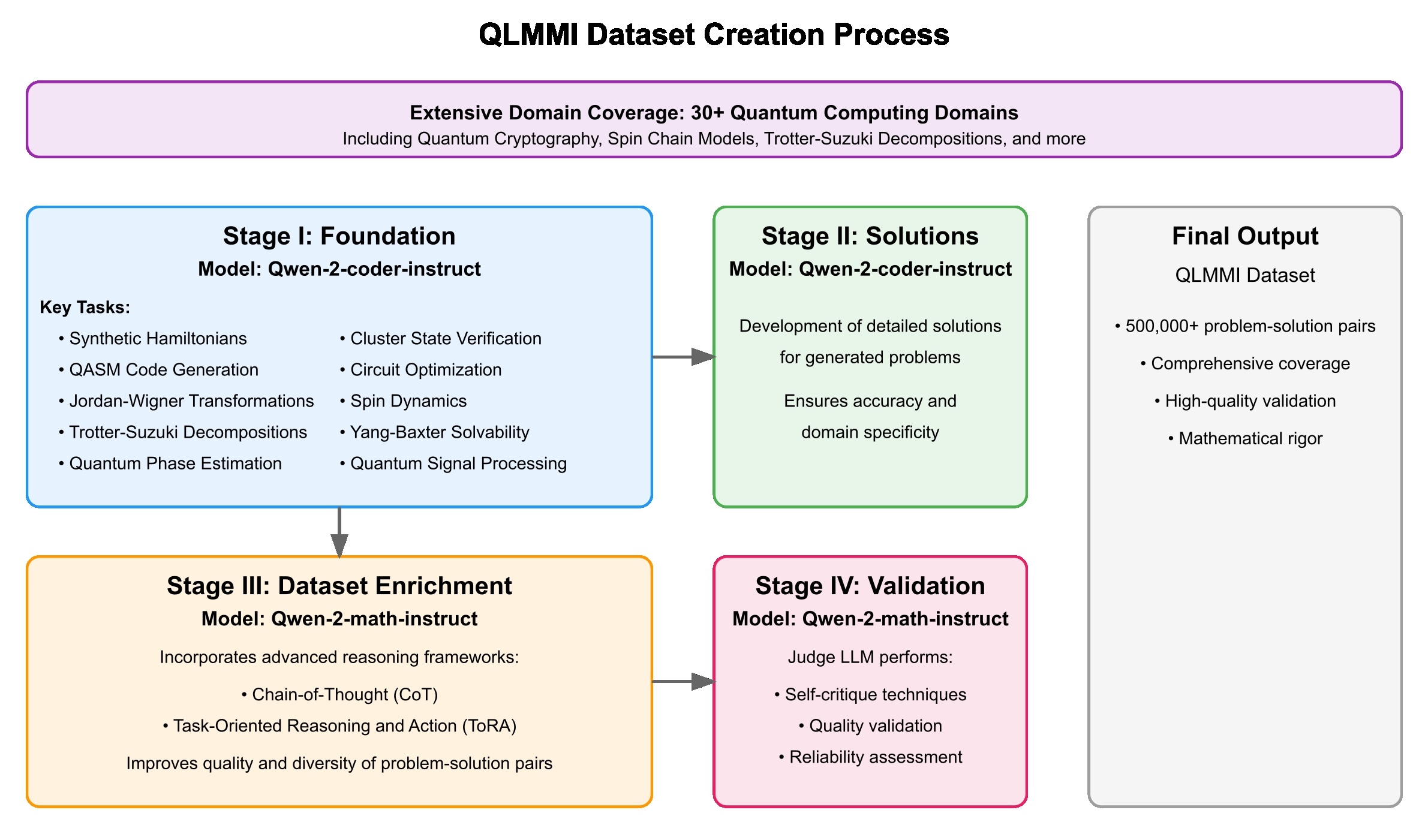title: QuantumLLMInstruct
emoji: 🦀
colorFrom: green
colorTo: indigo
sdk: docker
pinned: false
short_description: 'QuantumLLMInstruct: A 500k LLM Instruction-Tuning Dataset'
QuantumLLMInstruct: A 500k LLM Instruction-Tuning Dataset with Problem-Solution Pairs for Quantum Computing
Dataset Overview
QuantumLLMInstruct (QLMMI) is a groundbreaking dataset designed to fine-tune and evaluate Large Language Models (LLMs) in the domain of quantum computing. This dataset spans 90 primary quantum computing domains and contains over 500,000 rigorously curated instruction-following problem-solution pairs.
The dataset focuses on enhancing reasoning capabilities in LLMs for quantum-specific tasks, including Hamiltonian dynamics, quantum circuit optimization, and Yang-Baxter solvability.
Each entry consists of:
- A quantum computing problem expressed in natural language and/or LaTeX.
- A detailed step-by-step solution, designed for precision and clarity.
- Domain-specific metadata, such as the problem's main domain, sub-domain, and associated tags.
Data Sources
The dataset leverages cutting-edge methodologies to generate problems and solutions:
- Predefined Templates: Problems crafted using robust templates to ensure domain specificity and mathematical rigor.
- LLM-Generated Problems: Models such as
Qwen-2.5-Coderautonomously generate complex problems across diverse quantum topics, including:- Synthetic Hamiltonians
- QASM code
- Jordan-Wigner transformations
- Trotter-Suzuki decompositions
- Quantum phase estimation
- Variational Quantum Eigensolvers (VQE)
- Gibbs state preparation
- Advanced Reasoning Techniques: Leveraging Chain-of-Thought (CoT) and Task-Oriented Reasoning and Action (ToRA) frameworks to refine problem-solution pairs.
Structure
The dataset contains the following fields:
images: Optional multimodal inputs, such as visualizations of quantum circuits or spin models.problem_text: The quantum computing problem, formatted in plain text or LaTeX.solution: A detailed solution generated by state-of-the-art LLMs.main_domain: The primary quantum domain, e.g., "Quantum Spin Chains" or "Hamiltonian Dynamics."sub_domain: Specific subtopics, e.g., "Ising Models" or "Trotterization."tags: Relevant tags for classification and retrieval.model_name: The name of the model used to generate the problem or solution.timestamp: The date and time of creation.
Key Features
- Comprehensive Coverage: Spanning 90 primary domains and hundreds of subdomains.
- High Quality: Problems and solutions validated through advanced reasoning frameworks and Judge LLMs.
- Open Access: Designed to support researchers, educators, and developers in the field of quantum computing.
- Scalable Infrastructure: Metadata and structure optimized for efficient querying and usage.
Example Domains
Some of the key domains covered in the dataset include:
- Synthetic Hamiltonians: Energy computations and time evolution.
- Quantum Spin Chains: Ising, Heisenberg, and advanced integrable models.
- Yang-Baxter Solvability: Solving for quantum integrable models.
- Trotter-Suzuki Decompositions: Efficient simulation of Hamiltonian dynamics.
- Quantum Phase Estimation: Foundational in quantum algorithms.
- Variational Quantum Eigensolvers (VQE): Optimization for quantum chemistry.
- Randomized Circuit Optimization: Enhancing algorithm robustness in noisy conditions.
- Quantum Thermodynamics: Gibbs state preparation and entropy calculations.
Contributions
This dataset represents a collaborative effort to advance quantum computing research through the use of large-scale LLMs. It offers:
- A scalable and comprehensive dataset for fine-tuning LLMs.
- Rigorous methodologies for generating and validating quantum problem-solving tasks.
- Open-access resources to foster collaboration and innovation in the quantum computing community.
Cite: @dataset{quantumllm_instruct, title={QuantumLLMInstruct: A 500k LLM Instruction-Tuning Dataset with Problem-Solution Pairs for Quantum Computing}, author={Shlomo Kashani}, year={2025}, url={https://huggingface.co/datasets/QuantumLLMInstruct} }
